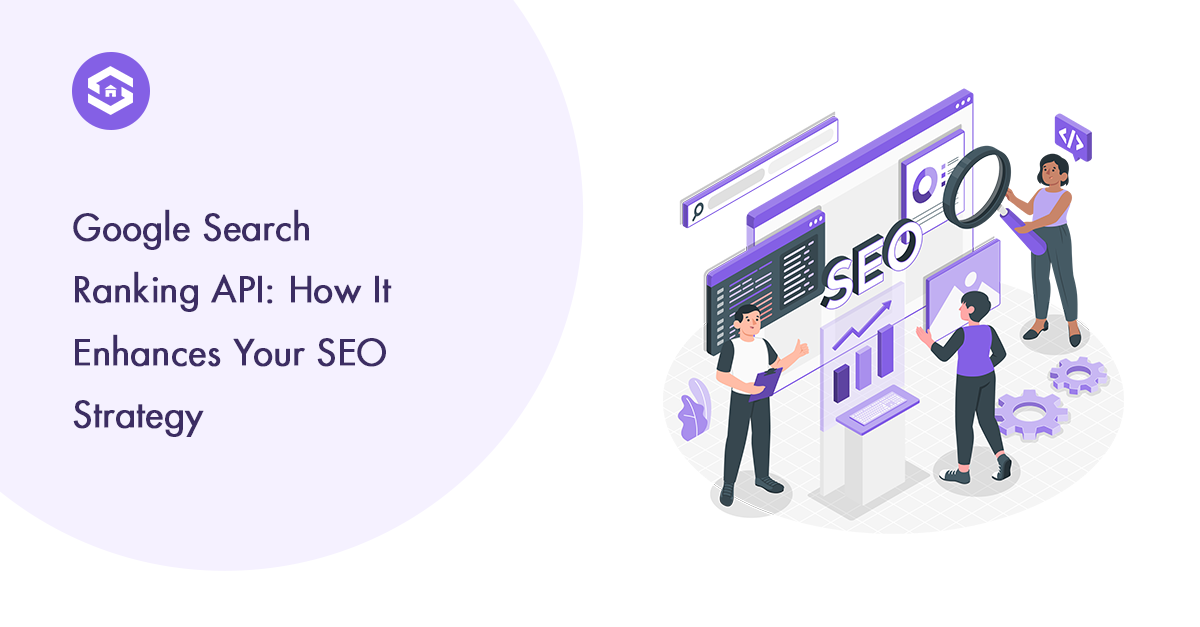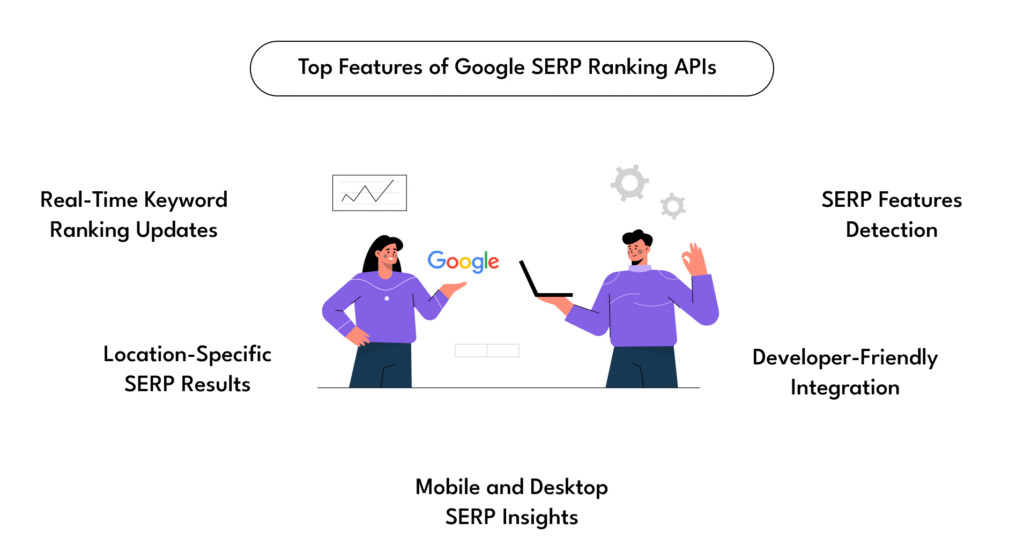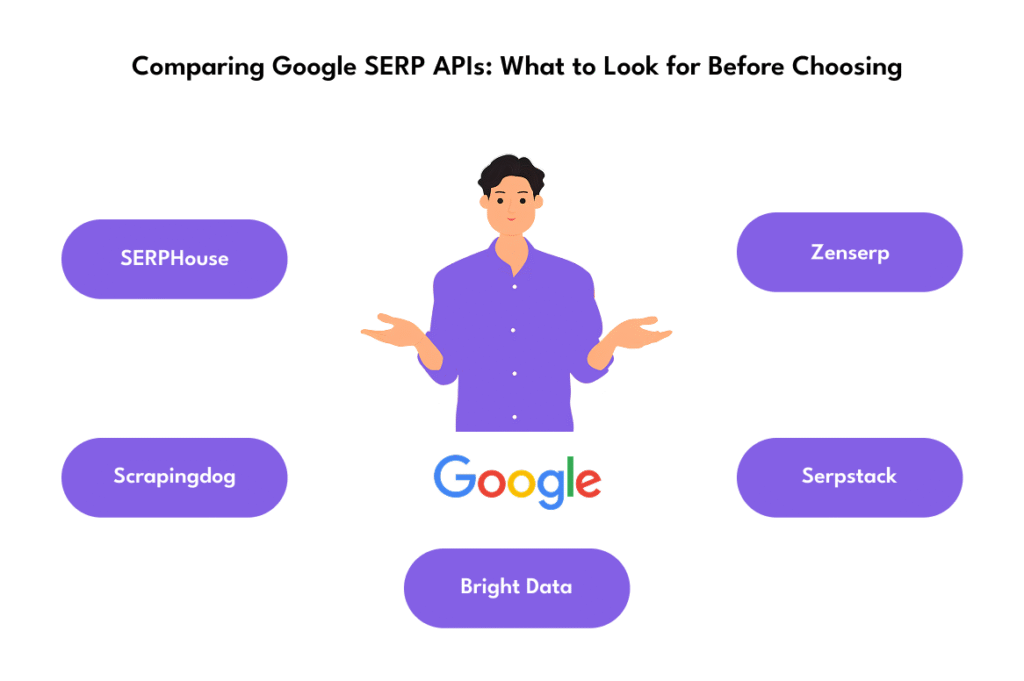Exploring the Google Search Ranking API: Key Features and Benefits
9 min read
9 min read

Table of Contents
Table of Contents
Hey there! So, you’re curious about Google Search Ranking APIs? That’s a fascinating topic, especially if you’re into web development, SEO, or building AI-driven applications. Let’s break it down in a way that’s easy to follow and understand.
To stay competitive in SEO in 2025, more than just content and backlinks are required—precise keyword rank tracking and extensive visibility into real-time search engine performance. That’s where the Google Search Ranking API steps in.
Instead of spending hours manually checking rankings or using outdated scraping tools that might break after every Google update, this search engine results API offers clean, structured data through reliable endpoints. Whether you’re an SEO agency monitoring thousands of keywords or a SaaS platform building automated keyword position reports, the Google Search Ranking API provides a faster, more scalable alternative.
Google’s algorithm now evolves in real time, with AI and personalization playing a huge role in how results appear. Traditional tools struggle to keep up with this rapid change. That’s why businesses in 2025 rely on APIs that return real-time keyword positions, mobile SERP results, and localized rankings without needing to scrape raw HTML or use proxy rotations.
With resources such as specific geographical tracking, monitoring research intentions, and SERP resource detection, this API enables users to see not only where they classify but also why and how rankings change over time. By offering a clearer image of what is working and not, you also get reliable access to search engine visibility metrics.
This is especially useful for eCommerce businesses, local service providers, and digital agencies that need consistent data to track performance, make strategic decisions, and adjust campaigns in real time.
All of this data helps you build a smarter, data-driven SEO strategy. By using the Google Search Ranking API, you can cut through the noise and focus only on accurate ranking metrics that matter to your business or clients.

When it comes to building a powerful SEO strategy in 2025, access to the right data is everything. The Google Serp ranking API is not just where a keyword ranks – it provides profound and actionable information that generates smarter decisions. Be optimizing a small site or running a huge keyword campaign in global markets, these APIs offer a variety of features designed to provide accurate and real-time ranking data with ease.
Let’s explore some of the top features that make Google SERP Ranking APIs a must-have for SEO professionals and developers today.
Speed matters in SEO. With the Google Serp ranking API, you get real-time keyword data as soon as you need it. This means that you are not waiting for daily or weekly updates – you can immediately track ranking changes and respond quickly to algorithm shifts or competitor activity.
For companies that run time-sensitive campaigns or monitor seasonal trends, this real-time keyword ability is critical. Whether you push a product launch or analyze a sudden traffic spike, with immediate access to fresh ranking data gives you a competitive advantage.
One of the most helpful aspects of any Google ranking API is the ability to target geo-specific search results. You can follow rankings at the city, state, and national levels to observe how your website performs in different local marketplaces.
This is especially important for businesses that target customers in certain areas. Whether you’re a local service provider or a global brand, having location-based ranking data allows you to fine-tune your SEO efforts and tailor your content to the most important audiences.
User behaviour continues to shift, with mobile searches now outpacing desktop in most industries. Google SERP APIs reflect this reality by offering device-based search tracking. You can pull ranking data separately for mobile and desktop devices, helping you understand how your site performs across different platforms.
This feature is essential if you are optimizing for mobile indexing, where mobile results determine your overall classification potential. By comparing the performance between devices, you can discover critical gaps and take targeted measures.
The search results page isn’t just about blue links anymore. Google’s SERPs are filled with rich features like featured snippets, map packs, “People also ask” boxes, and paid ads. A modern SERP API doesn’t just report your position—it also shows what features are present for each keyword.
This helps you understand which opportunities exist beyond traditional rankings. For example, if you’re ranking #4 but there’s a featured snippet above, your actual visibility may be lower than expected. With SERP feature detection, you can adjust your strategy to target those elements directly.
If you manage thousands of keywords or build SEO dashboards for customers, scalability matters. Most SERP APIs are designed with developers in mind, offering clean documentation, RESTful endpoints and customizable parameters. You can easily integrate them with your internal tools, CRMs or reporting systems.
This means you don’t just get access to data—you get the flexibility to use it however you want, whether that’s powering a full reporting suite or syncing daily results into your BI platform.
If you’ve ever managed SEO at scale, you know how frustrating it is to chase down ranking updates from multiple tools, copy-paste screenshots, or wait for delayed reports. That’s where the Google Search Ranking API really proves its worth—it brings you the exact data you need, right when you need it, without the clutter.
Instead of wasting hours checking Google manually or refreshing browser tabs, you get real-time keyword performance pulled directly from the search engine. No guessing, no lag. This is especially useful when rankings fluctuate suddenly after an algorithm update—you’re not caught off guard.
Another standout benefit? Localized ranking data. You can see how your keywords perform in specific cities, regions, or even languages. Whether you’re optimizing for Toronto or targeting multiple regions in Canada, geo-specific ranking data helps you create more targeted content.
The API also gives you separate results for mobile and desktop, which matters now more than ever with mobile-first indexing driving search behavior. And with automated SEO reports integrated into your workflow, your team saves time and gets cleaner, more reliable data—no spreadsheets required.
When choosing a Google SERP API, it’s important to go beyond the basics. Accuracy, performance, scalability, and developer experience all matter. Let’s compare five popular options—SERPHouse, Scrapingdog, Bright Data, Serpstack, and Zenserp—to help you make an informed decision.

If you’re looking for real-time SERP tracking with a clean API and deep location coverage, SERPHouse is an excellent choice. It provides highly accurate search data for mobile and desktop, supports over 100+ search engine variants, and is ideal for businesses that require frequent keyword updates and search engine visibility tracking.
Scrapingdog is best suited for those starting or running lightweight SEO projects. It offers a simple interface, affordable pricing, and decent keyword ranking data for basic campaigns. While it’s not as feature-rich as enterprise tools, it works well for low-volume or localized tracking needs.
Known for its massive infrastructure and global SERP coverage, Bright Data is built for scale. It’s used by large teams that need millions of requests per day with advanced filtering. Its strength lies in enterprise-level SEO automation, but the setup and cost may be high for smaller businesses.
Serpstack balances ease of use with power. It features robust API documentation, making it perfect for developers integrating SERP results into dashboards or analytics tools. With JSON responses and fast response times, it’s a reliable option for both startups and SEO platforms.
Zenserp is an underrated but powerful choice, especially for global marketers. It supports precise geo-targeted keyword tracking across multiple countries and languages. The API is straightforward, and their results are clean and structured—great for teams focused on multi-region SEO campaigns.

Working with a Google SERP API can be powerful—but like any tool, it comes with its fair share of hiccups. If you’re running into problems, don’t worry. Most issues are common and easily fixable once you know where to look.
Here are a few ways to troubleshoot smartly:
As we look at the future, search APIs will continue to evolve, driven by advances in AI and machine learning. Expect more real-time data processing with geographic ranking features becoming even more accurate. APIs will be perfectly integrated with SEO automation tools, providing deeper information about the performance of the keywords on various devices. We will also see a greater focus on mobile indexing, reflecting the growing importance of mobile SEO. As technology improves, search APIs will become faster, more intelligent, and more essential for maintaining a competitive advantage in digital marketing strategies.
In short, search APIs are transforming how companies track and optimize their presence online. Whether you are an SEO professional, developer or digital trader, the importance of reliable real-time data cannot be exaggerated. You can use these tools to get information that can help you make more informed and data-driven decisions. As we approach 2025, these technologies will become even more powerful, allowing companies to stay ahead of the curve in an increasingly competitive digital scenario. Embrace the future of SEO with the proper API and observe your digital campaigns thrive.